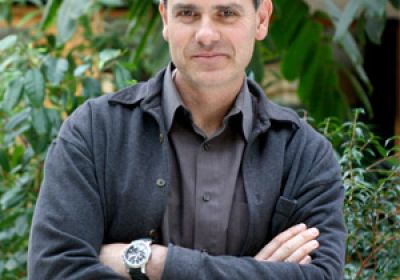
-
 This is the last issue of Green Left Weekly for this year. Our small staff which works very hard, week after week, to get out this publication will take a much-needed break after a hectic political year, and get ready to relaunch in mid-January. The 2012 Green Left Fighting Fund has now raised about $193,000 so we have to try to raise a further $57,000 by the end of the year to get to our $250,000 target — or as close as we can get.
This is the last issue of Green Left Weekly for this year. Our small staff which works very hard, week after week, to get out this publication will take a much-needed break after a hectic political year, and get ready to relaunch in mid-January. The 2012 Green Left Fighting Fund has now raised about $193,000 so we have to try to raise a further $57,000 by the end of the year to get to our $250,000 target — or as close as we can get. -
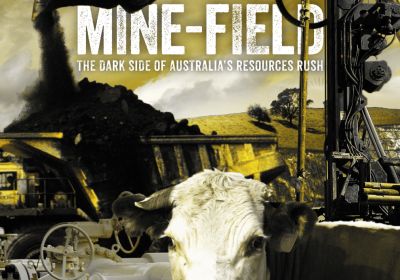 For its final issue of 2012, Green Left asked staff, contributors and others to name their book of the year. Mel Barnes Co-editor of Green Left Weekly Mine-field By Paul Cleary Black Inc http://bit.ly/NdE39u In his follow-up to Too Much Luck, Paul Cleary travels throughout Australia to speak to people affected by the rapid coal and coal seam gas expansion taking place.
For its final issue of 2012, Green Left asked staff, contributors and others to name their book of the year. Mel Barnes Co-editor of Green Left Weekly Mine-field By Paul Cleary Black Inc http://bit.ly/NdE39u In his follow-up to Too Much Luck, Paul Cleary travels throughout Australia to speak to people affected by the rapid coal and coal seam gas expansion taking place. -
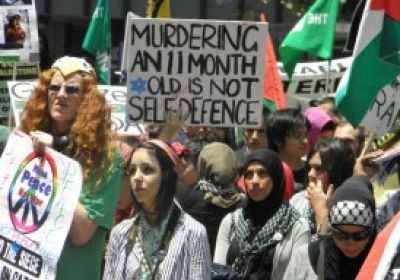 Israel's latest attack on Gaza killed about 32 times more Palestinians than Israelis killed by Palestinian rockets. But few who followed mainstream media reports would realise this fact. When the ceasefire was announced on November 21, 161 Palestinians and five Israelis had been killed in the attacks, CBSnews.com said. The Palestinian Centre for Human Rights said that by November 20, 66% of Palestinians killed were civilians. Of the more than 900 Palestinians injured, 97% were civilians.
Israel's latest attack on Gaza killed about 32 times more Palestinians than Israelis killed by Palestinian rockets. But few who followed mainstream media reports would realise this fact. When the ceasefire was announced on November 21, 161 Palestinians and five Israelis had been killed in the attacks, CBSnews.com said. The Palestinian Centre for Human Rights said that by November 20, 66% of Palestinians killed were civilians. Of the more than 900 Palestinians injured, 97% were civilians. -
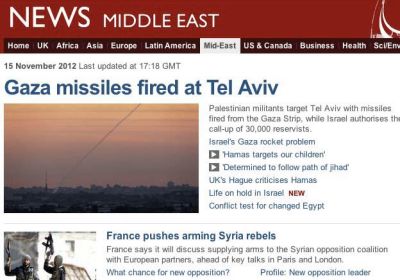 In Peter Watkins' remarkable BBC film, The War Game, which foresaw the aftermath of an attack on London with a one-megaton nuclear bomb, the narrator says: “On almost the entire subject of thermo-clear weapons, there is now practically total silence in the press, official publications and on TV. Is there hope to be found in this silence?” The truth of this statement was equal to its irony. On November 24, 1965, the BBC banned The War Game as “too horrifying for the medium of broadcasting”.
In Peter Watkins' remarkable BBC film, The War Game, which foresaw the aftermath of an attack on London with a one-megaton nuclear bomb, the narrator says: “On almost the entire subject of thermo-clear weapons, there is now practically total silence in the press, official publications and on TV. Is there hope to be found in this silence?” The truth of this statement was equal to its irony. On November 24, 1965, the BBC banned The War Game as “too horrifying for the medium of broadcasting”. -

Christine Assange discusses WikiLeaks, Julian Assange, her time in Ecuador, the nature of the United States, the Australian government's lack of support for the rights of her son, the mainstream media, the need for alternatives and more.
-
As in every vicious military offensive Israel carries out in Gaza, the dominant narrative is that it is a response to rocket fire from Gaza into southern Israel. This is how it’s being reported in the US, and this is how virtually every American understands it. And it is a lie.
-

Messages of support for Julian Assange from some of the 300 people at Green Left Weekly's 'defend WikiLeaks' dinner in November 10. Special guest was passionate advocate Christine Assange, the mother of the WikiLeaks founder, who gives a warm message to her son.
-
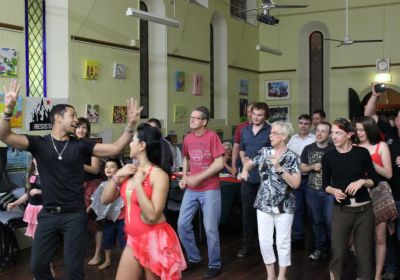 Adelaide's annual Green Left Weekly dinner fundraiser on November 10 brought together supporters from unions, social justice groups and the activist community, raising more than $1000 for the paper. This year, Sue Bull from the Geelong branch of Socialist Alliance delivered an impassioned keynote speech on the rising electoral support for socialists nationwide. Assistant Secretary of Australian Services Union (SA/NT) Joseph Scales also addressed the event, praising GLW for its support of workers' struggles.
Adelaide's annual Green Left Weekly dinner fundraiser on November 10 brought together supporters from unions, social justice groups and the activist community, raising more than $1000 for the paper. This year, Sue Bull from the Geelong branch of Socialist Alliance delivered an impassioned keynote speech on the rising electoral support for socialists nationwide. Assistant Secretary of Australian Services Union (SA/NT) Joseph Scales also addressed the event, praising GLW for its support of workers' struggles. -
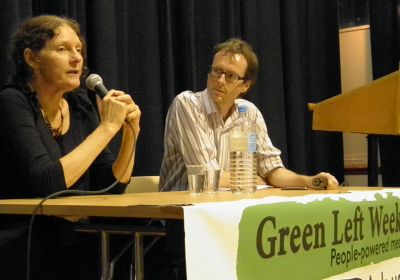 More than 300 people packed out the Leichhardt Town Hall on November 10 for the Green Left Weekly annual dinner in Sydney with guest speaker Christine Assange. “I've come here tonight not just to support Julian but also to support Green Left Weekly," said Assange. “We need you guys to keep having the guts to tell the truth!”
More than 300 people packed out the Leichhardt Town Hall on November 10 for the Green Left Weekly annual dinner in Sydney with guest speaker Christine Assange. “I've come here tonight not just to support Julian but also to support Green Left Weekly," said Assange. “We need you guys to keep having the guts to tell the truth!” -
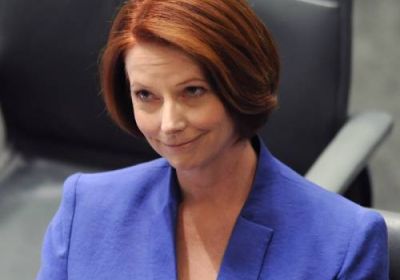 I constantly scan the internet for breaking news, but I first found out that Prime Minister Julia Gillard's speech mercilessly lambasting opposition leader Tony Abbott for being a misogynist was going viral from my 16-year-old daughter. She temporarily disconnected from the multiple social media she inhabits to call out to me: “Dad, have you seen that AWESOME Julia Gillard speech? EVERYBODY is talking about it!” An hour later it was in the news headlines: PM's speech goes viral.
I constantly scan the internet for breaking news, but I first found out that Prime Minister Julia Gillard's speech mercilessly lambasting opposition leader Tony Abbott for being a misogynist was going viral from my 16-year-old daughter. She temporarily disconnected from the multiple social media she inhabits to call out to me: “Dad, have you seen that AWESOME Julia Gillard speech? EVERYBODY is talking about it!” An hour later it was in the news headlines: PM's speech goes viral. -
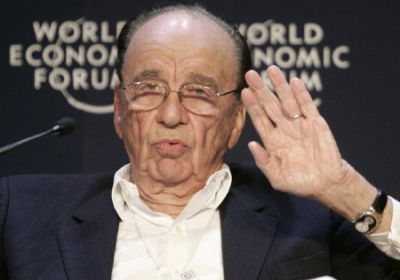 Dial M for Murdoch: News Corporation & the Corruption of Britain Tom Watson & Martin Hickman Penguin Books 2012, 360 pages, £20.00 This book provides much needed background information to the Levenson inquiry, which investigated the phone hacking scandal of Rupert Murdoch-owned newspapers and its cast of characters.
Dial M for Murdoch: News Corporation & the Corruption of Britain Tom Watson & Martin Hickman Penguin Books 2012, 360 pages, £20.00 This book provides much needed background information to the Levenson inquiry, which investigated the phone hacking scandal of Rupert Murdoch-owned newspapers and its cast of characters. -
In the first episode of The Chaser’s new series The Hamster Wheel on ABC TV, the comedy group poked fun at Green Left Weekly for being the only media to challenge the distorted mainstream media’s reports of the supposed “violent Muslim protest” in Sydney on September 15.